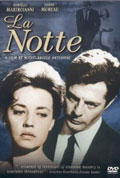
Italy 1961
Directed by
Michelangelo Antonioni
121 minutes
Rated PG
Reviewed by
Bernard Hemingway

Notte, La
Following on from his breakthrough success with L'Avventura (1960), director and co-writer Michelangelo Antonioni sets his lugubrious story of a married couple who have realized that they are no longer in love with each other over the course of a single day and night..Marcello Mastroianni plays Giovanni Pontano, a much-admired writer who no longer believes in his work as an “intellectual” and Jeanne Moreau is his equally alienated estranged wife, Lidia, in a film which exemplifies the mood of existential ennui, emotional froideur and intellectual disenchantment (you can redistribute the adjectives as you choose) which was all the rage in European art cinema of the 1960s. Indeed Mastroianni starred in the most famous instance of the style, Fellini's La Dolce Vita, released the previous year, in which his flaneur of modern life wandered the streets of Rome, drifting from night-spot to party with a similarly disaffected gaze.
Here it is more Moreau who is the detached observer as the pair visit a dying friend, another existentially resigned writer, in hospital where Giovanni is propositioned by a nymphomaniacal mental patient, visit a night club where a Negro couple perform a bizarre (or perhaps in the day it was meant to be “cool”) libidinal dance before heading to a millionaire indusrialist’s party where both flirt with a sexual dalliance before falling to the ground in the early morning light in a half-hearted attempt at love-making,
With the aid of the fine cinematography of Gianni Di Venanzo (who lensed Fellini;s Guilietta Degli Spiriti, 1965), Antonioni creates a characteristically visually redolent portrait of spiritual weariness and urban alienation but also one which is probably less diverting than it was in its day (it won Best Film at Berlin in 1961) and which now feels unnecessarily protracted.
In typical form Mastroianni is,coolly laconic, but Moreau, who looks decidedly unattractive, has little to do and it is nowonder that she was unhappy with her performance. Antonioni’s regular star, Monica Vitti, brings a ray of much-needed light towards the end of proceedings, even managing to shake Giovanni out of his lethargy.
FYI: Interested parties may like to compare this with Roberto Rossellini’s Viaggio in Italia (1953) a more dramatically conventional but, some would also say, a more dramatically satisfying portrait of a marriage in crisis.
Want something different?





